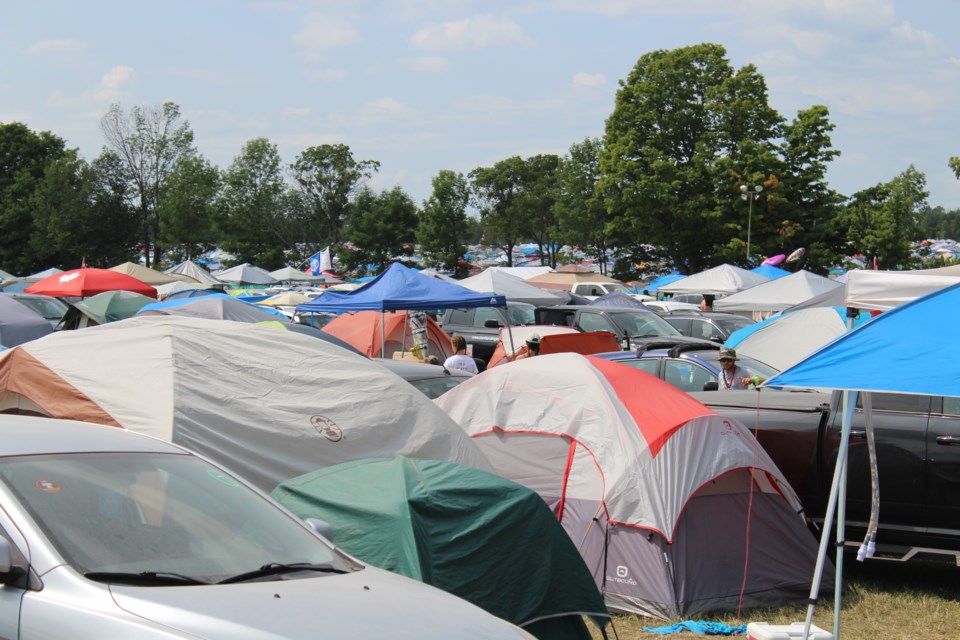The Ontario Municipal Board (OMB), now known as the Local Planning Appeal Tribunal (LPAT), has ruled that Burl's Creek is not contravening any zoning bylaws or planning laws.
The Tribunal has decreed that the two citizens’ groups who had concerns about Burl’s Creek hosting large-scale concerts and camping at its Oro-Medonte park between Orillia and Barrie, were not successful in their attempts to convince the body planning rules were being broken.
In a 12-page ruling released late Thursday, LPAT member Sharyn Vincent said the Township of Oro-Medonte, the County of Simcoe and Burl’s Creek were not violating any provincial land-use rules in hosting concerts and camping at the sprawling property on Line 8.
Save Oro and the West Oro Ratepayers Association (WORA) had appealed to the OMB over concerns about the use of the agricultural land on which the park sits.
But Vincent determined the real crux of the issue focused on neighbours’ concerns about the ‘hullabaloo’ created by large-scale concerts at the venue.
“It was evident from the issues and testimony of (Save Oro and WORA) that the principal issues were those of the neighbours who reside opposite on the south side of the country concession which provides principle access to the event venue,” Vincent wrote in her ruling.
“The main opposition to the proposed amendments lies in the proposition of, as described by their counsel, to include, ‘wild parties, people swimming naked in the lake, aggressively accosting residents on their properties, using privately-owned sugar-bush as a liquor and weapons depot, urinating and defecating indiscriminately across the road from the residents’ continuing in perpetuity. More concisely, there issues were referred to as the ‘hullaballoo’ when raised in evidence.”
She wrote the two citizens’ groups “failed” to persuade the tribunal of their “contrary” position.
In a previous OMB decision in 2017, the OMB ruled in favour of permitting a temporary use bylaw that permitted the uses at Burl’s Creek. That was extended, by a minister's order, through the end of 2019.
Vincent laid out multiple reasons for siding with Burl’s Creek in her ruling.
She referred to the ‘dual/reversionary’ use of the property - a term coined during the previous OMB hearing.
That term was used to describe the “consecutively alternating use of the lands to produce a viable rye grass crop around scheduled events when the lands may be used for a combination of parking, camping and concession booths to varying degrees, depending on attendance.”
She said the concept “is consistent with the provincial policy statement (PPS) to protect prime agricultural lands because no lands, according to numerous witnesses ...will be permanently taken out of production.”
Vincent said the “Save Oro/WORA argument advanced through their planner, Victor Doyle, asserting that the PPS directive to protect prime agricultural lands is paramount, subject to the condition of the PPS to contemplate ‘limited nonresidential uses', fails as having no foundation.”
Vincent also denied an arguement from Robert Clark, a planner/agrology expert testifying on behalf of SaveOro/WORA, that a 2,000-metre (rather than a 1,000-metre) buffer be required between the site and existing livestock operations.
It “became clear” to the tribunal that Clark was “intent on attempting to introduce the merits of requiring not only additional separation but also visual buffering for his clients’ residences,” wrote Vincent.
She said he was “attempting to push the potential southerly limits of any parking or camping as far away as possible, to be supplemented by planted berming.”
However, these “objectives have nothing to do” with the PPS test “which addresses the protection of agricultural uses and not rural residential,” wrote Vincent.
The ruling also cited an evening session of the LPAT hearing where participants from the “broader community” were in attendance to express their views.
“In general, the anecdotal evidence supported the economic benefits attributable to the events that ranged from hotel occupancies to the creation of part- time jobs and dedicated soccer fields,” noted Vincent in her ruling.
“The Tribunal is persuaded that these broader community benefits offset the predictable, temporary traffic inconveniences and impacts experienced by the surrounding community on a limited number of days over the calendar year. The location of the site, with excellent access to Highway 11 to the west, limits traffic impacts on the principal settlement areas located closer to the lake.”
This is what Vincent wrote in her conclusion:
“The Tribunal finds that the township in particular advanced a balanced approach through the evidence by analyzing the merits of the proposal against any negative impacts on matters of provincial interest. Taken together with the township’s Official Plan community vision and objectives to maintain the agricultural character while capturing tourism benefits, the evidence is weighted in favour of the merit of the applications
"It is the finding of the Tribunal that the proposed Official Plan and Zoning amendments are consistent with the (PPS) and conform to the Growth Plan for the Greater Golden Horseshoe. The amendments to the Township Official Plan and zoning by-law conform to the County Official Plan, and the provisions of the Township Official Plan otherwise applicable.”
Oro-Medonte Mayor Harry Hughes could not be reached for comment. A representative from Save Oro did not respond to a request for comment.
However, the ruling drew a round of applause from Derick Lehmann, who was part of a group formed in favour of the event park.
“I’m very excited to hear the decision made today,” said Lehmann. “Our group has been supporting Burl’s Creek for a long time because we see the value in having such a great venue in the area.
“It’s a world-class facility and the decision today shows that they can have both agricultural and entertainment use of the property. The overwhelming majority have said they would rather ‘Share Oro' and today’s decision backs that up.”



